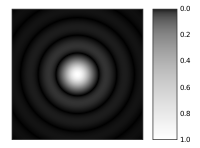
Photo from wikipedia
The concept of orthonormal polynomials is revisited by developing a Zernike-based orthonormal set for a non-circular pupil that is transmitting an aberrated, non-uniform field. We refer to this pupil as… Click to show full abstract
The concept of orthonormal polynomials is revisited by developing a Zernike-based orthonormal set for a non-circular pupil that is transmitting an aberrated, non-uniform field. We refer to this pupil as a general pupil. The process is achieved by using the matrix form of the Gram-Schmidt procedure on Zernike circle polynomials and is interpreted as a process of balancing each Zernike circle polynomial by adding those of lower order in the general pupil, a procedure which was previously performed using classical aberrations. We numerically demonstrate this concept by comparing the representation of phase in a square-Gaussian pupil using the Zernike-Gauss square and Zernike circle polynomials. As expected, using the Strehl ratio, we show that only specific lower-order aberrations can be used to balance specific aberrations, for example, tilt cannot be used to balance spherical aberration. In the process, we present a possible definition of the Maréchal criterion for the analysis of the tolerance of systems with apodized pupils.
Journal Title: Applied optics
Year Published: 2017
Link to full text (if available)
Share on Social Media: Sign Up to like & get
recommendations!